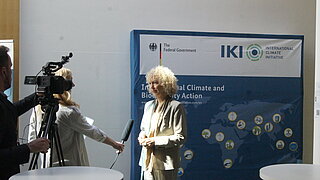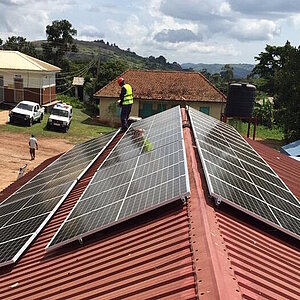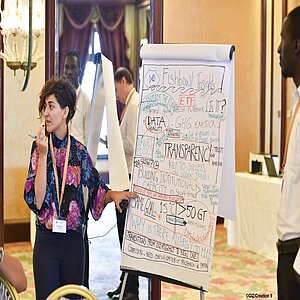Addressing climate change through integrated responses

Peer Learning Summit on integrating climate adaptation, mitigation and development approaches.
What are the synergies and trade-offs of integrated climate change responses and how can they be addressed in long-term planning processes? These were key questions asked at the Virtual Peer Learning Summit, co-organized in November 2021 by the Low Emission Development Strategies Global Partnership (LEDS GP) and the National Adaptation Plan (NAP) Global Network, with the assistance of the International Climate Initiative (IKI).
The Peer Learning Summit in focus
With more than 100 participants, the summit served as an open space for showcasing experiences from international experts, country representatives and practitioners working on integrating adaptation, mitigation, and development approaches.
The three sessions focused on framing the issues, discussing among peers, and learning from success stories from Peru, Ethiopia, Jamaica, Mexico, Kazakhstan, and Costa Rica.
Representatives from the OECD, the Organization of the Eastern Caribbean States, the Green Climate Fund, GIZ, Factor and AGNES Africa shared technical insights assessing trade-offs and benefits.
The third and final session of the summit was organized as part of the New York City Climate Week 2021.
Mitigation and adaptation are two sides of the same coin
When planning for climate projects, both approaches need to be combined into one process, where timelines and goals can be assessed and jointly addressed. Therefore, policies should be designed in such a way that they maximize synergies and enhance the effectiveness of climate mitigation and resilience-building efforts.
In what was described as the process of “adaptigation”, integrated planning for climate action (i.e. linking adaptation and mitigation) is a win-win for all, creating broad political support and longevity when linked to long-term strategies.
Participants highlighted the relevance of early communication on the linkage of adaptation and mitigation, as well as engaging with different stakeholders and partners. A steady narrative and timely information can make it easier for everyone to find benefits along the way, deliver joint objectives and likely save resources.
What makes integrated approaches successful?
Many sectors still underestimate the need for adaptation. In particular, the ones that are largely focused on mitigation often require support in understanding the risk they are facing from climate change, so they can assess and design appropriate solutions. The climate narrative is not always working to convince all parties. Instead, an economic perspective show casing losses and gains can be a better ally to enable a broader and high-level buy-in for integrated approaches.
However, good examples can be found in energy, infrastructure, agriculture, water, or cities. Nature-based solutions, for instance, can be an effective tool to operationalize the linkages, by providing both mitigation and adaptation benefits (e.g. green roofs, sustainable urban drainage systems, and mangrove restoration). In any case, success factors include strong coordination and dialogue, functional institutional settings, as well as better information allowing visibility of synergies.
Challenges to overcome
Some countries still struggle with measuring resilience, as resilience can mean different things to different people. Traditionally, measuring mitigation has been a lot easier than adaptation. This creates challenges around how to combine reporting for both. To integrate adaptation and mitigation both from a design and monitoring perspective, defining what resilience means in different contexts could be useful. One approach could be to include the NDC components of adaptation and mitigation in national MRV systems.
The organisations involved
The LDES GP is a global accelerator of knowledge and solutions that lead the way to climate resilient and low-carbon development. Since 2019, the LEDS GP operates with core support from the International Climate Initiative (IKI). Its global secretariat is co-hosted by IKI´s Support Project for the Implementation of the Paris Agreement (SPA), as well as the U.S. National Renewable Energy Laboratory (NREL).
The NAP Global Network supports developing countries to advance their NAP processes to help accelerate climate change adaptation efforts around the world.
The link has been copied to the clipboard
Contact
IKI Office
Zukunft – Umwelt – Gesellschaft (ZUG) gGmbH
Stresemannstraße 69-71
10963 Berlin
Further information


















